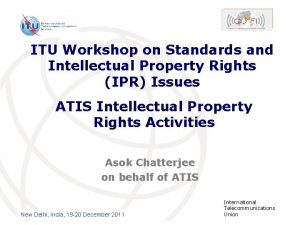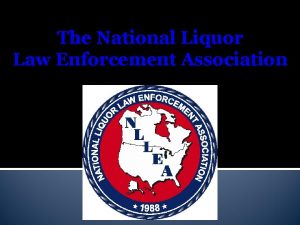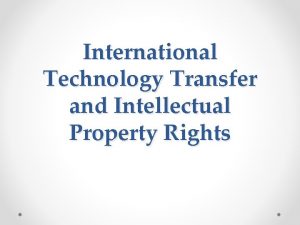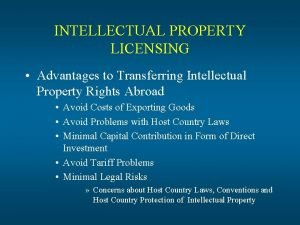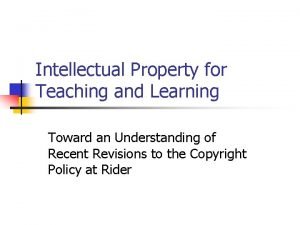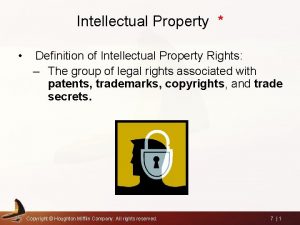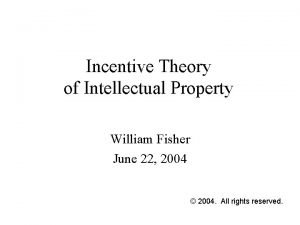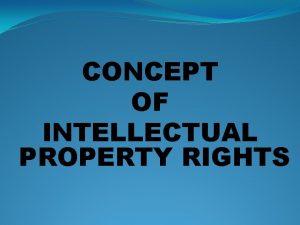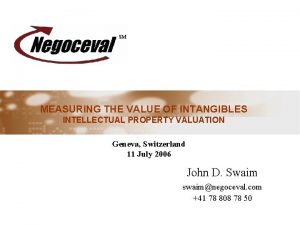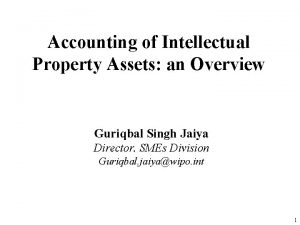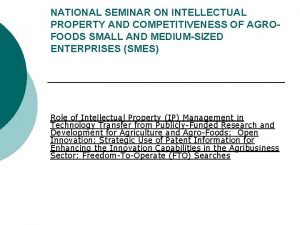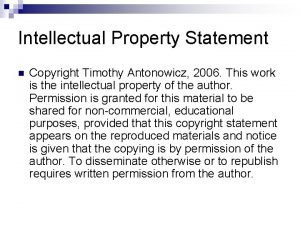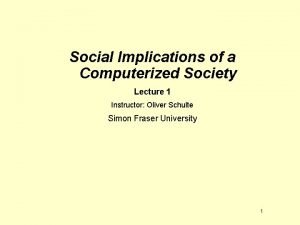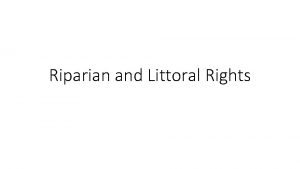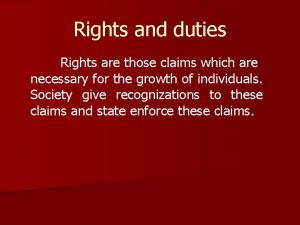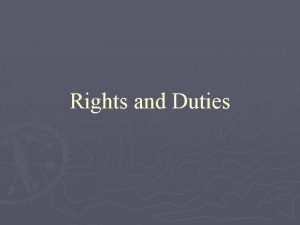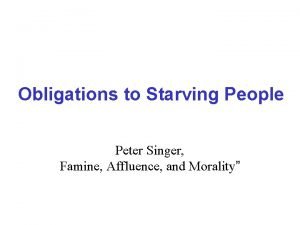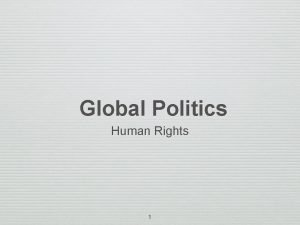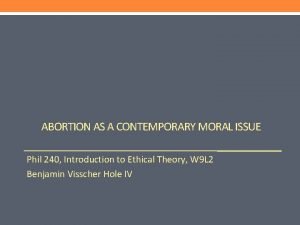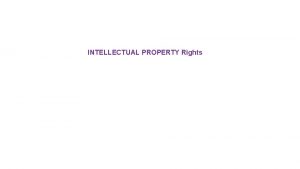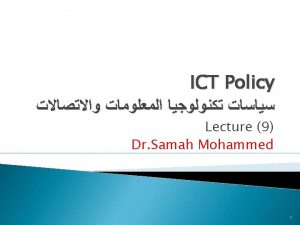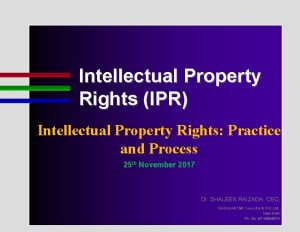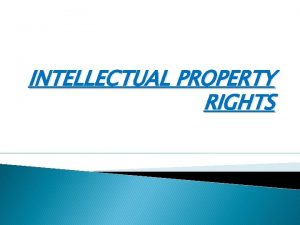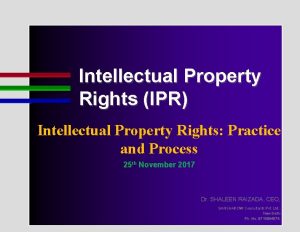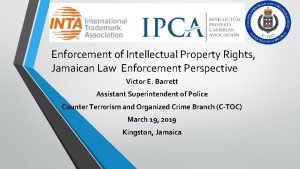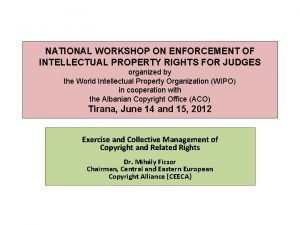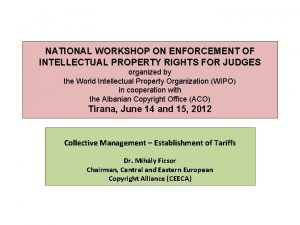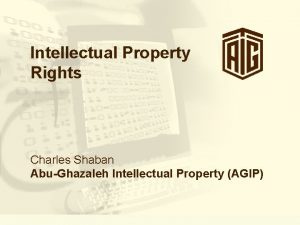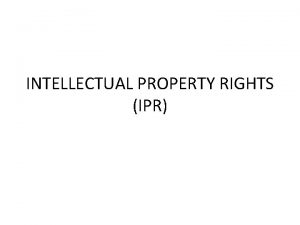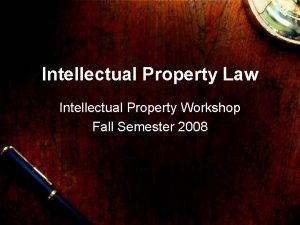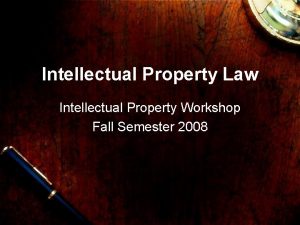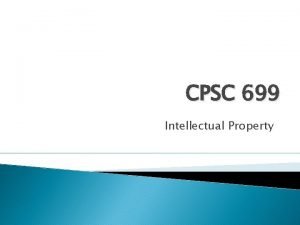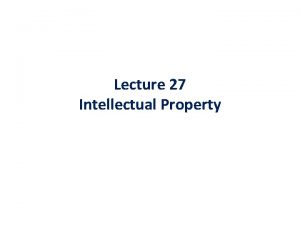NATIONAL WORKSHOP ON ENFORCEMENT OF INTELLECTUAL PROPERTY RIGHTS
































- Slides: 32

NATIONAL WORKSHOP ON ENFORCEMENT OF INTELLECTUAL PROPERTY RIGHTS FOR JUDGES organized by the World Intellectual Property Organization (WIPO) in cooperation with the Albanian Copyright Office (ACO) Tirana, June 14 and 15, 2012 European Union Norms on Enforcement of Intellectual Property Rights Dr. Mihály Ficsor Chairman, Central and Eastern European Copyright Alliance (CEECA)

I. GENERAL OBLIGATIONS ON ENFORCEMENT IN THE INTERNATIONAL TREATIES AND THE EU DIRECTIVE M. Ficsor, Tirana, June 14 -15, 2012 2

Berne Convention and Rome Convention • In the Berne Convention, only Articles 15, 16 and Article 36 may be regarded as covering certain issues of enforcement. Article 15, however, only provides for presumptions on who may institute infringement procedures and Article 16 just on seizure of infringing copies. It is Article 36 which addresses the other aspects of enforcement, but it does so only in the following very general way: (1) Any country party to this Convention undertakes to adopt, in accordance with its constitution, the measures necessary to ensure the application of this Convention. (2) It is understood that, at the time a country becomes bound by this Convention, it will be in a position under its domestic law to give effect to the provisions of this Convention. • Article 26 of the Rome Convention contains a provision similar to Article 36 of the Berne Convention. M. Ficsor, Tirana, June 14 -15, 2012 3

Phonograms Convention and Satellites Convention • The 1971 Phonograms Convention and the 1974 Satellites Convention differ to a certain extent from the Berne Convention and the Rome Convention. The difference does not consist in the level of details of the relevant obligations of the contracting parties, but rather in two aspects. First, that these two Conventions may be characterized as anti -piracy treaties to fight phonogram piracy and programme-carrying signal piracy, respectively. Secondly, that their quite few substantive provisions provide for performance obligations in the sense that they obligate the contracting parties to provide adequate protection against the relevant piratical acts but they leave very broad freedom to the parties how to achieve this result. • See Articles 2 and 3 of the (Geneva) Phonograms Convention and Article 2 of the (Brussels) Satellites Convention. M. Ficsor, Tirana, June 14 -15, 2012 4

TRIPS Agreement (1) • • The detailed enforcement provisions in Part III (Articles 41 to 61) of the TRIPS Agreement on enforcement represent an important new dimension of the protection of intellectual property rights is composed of five sections. Article 41 contains “General Obligations”, while the rest of the articles provide for specific obligations concerning “Civil and Administrative Procedures and Remedies” (Articles 42 to 49), “Provisional Measures” (Article 50), “Special Requirements Related to Border Measures” (Articles 51 -60), and “Criminal Procedures” (Article 61). As regards “General Obligations, ” TRIPS Article 41 is not only the broadest but also the most important provision of Part III. It contains the most general obligation that enforcement procedures must be made available by any Member "so as to permit effective action against any act of infringement, including expeditious remedies to prevent infringements and remedies which constitute a deterrent to further infringement. " M. Ficsor, Tirana, June 14 -15, 2012 5

TRIPS Agreement (2) Fair and equitable procedures TRIPS Article 42 WTO Members must make available to right holders civil judicial procedures concerning the enforcement of any intellectual property right covered by the Agreement. It contains provisions that do not only ensure efficient measures against infringers but also guarantees fair procedure for all interested parties. The Article states, inter alia, that the procedures must not impose overly burdensome requirements concerning mandatory personal appearances, and that all parties must be duly entitled to substantiate their claims and to present all relevant evidence. M. Ficsor, Tirana, June 14 -15, 2012 6

WIPO „Internet Treaties” (WCT and WPPT) Article 14 of the WIPO Copyright Treaty (WCT) and Article 23 of the WIPO Performances and Phonograms Treaty (WPPT) bear the title of Provisions on Enforcement of Rights, and they contain the following identical provisions: (1) Contracting Parties undertake to adopt, in accordance with their legal systems, the measures necessary to ensure the application of this Treaty. (2) Contracting Parties shall ensure that enforcement procedures are available under their law so as to permit effective action against any act of infringement of rights covered by this Treaty, including expeditious remedies to prevent infringements and remedies which constitute a deterrent to further infringements. M. Ficsor, Tirana, June 14 -15, 2012 7

EU Enforcement Directive 2004/48/EC of the European Parliament and of the Council of 29 April 2004 on the enforcement of intellectual property rights • Article 3. General obligation • 1. Member States shall provide for the measures, procedures and remedies necessary to ensure the enforcement of the intellectual property rights covered by this Directive. Those measures, procedures and remedies shall be fair and equitable and shall not be unnecessarily complicated or costly, or entail unreasonable time-limits or unwarranted delays. • 2. Those measures, procedures and remedies shall also be effective, proportionate and dissuasive and shall be applied in such a manner as to avoid the creation of barriers to legitimate trade and to provide for safeguards against their abuse. M. Ficsor, Tirana, June 14 -15, 2012 8

II. SPECIFIC ENFORCEMENT PROVISIONS OF THE TRIPS AGREEMENT AND THE EU DIRECTIVE M. Ficsor, Tirana, June 14 -15, 2012 9

Evidence (1) Evidence • TRIPS Article 43(1): where evidence that is likely to be important for one party is in the possession of the opposing party (such as invoices, shipping documents, and other information which may be needed for proving certain facts and establishing damages), courts must be empowered, provided that certain conditions are met, to order that party to produce the evidence. • Article 6. 1 of the EU Enforcement Directive of 2004 includes the same sort of provision and, in addition, this one: “For the purposes of this paragraph, Member States may provide that a reasonable sample of a substantial number of copies of a work or any other protected object be considered by the competent judicial authorities to constitute reasonable evidence. ” Whenever there is a relatively bigger number of suspected infringing copies, it must not be necessary to prove the infringing nature of all of them, or even a great number of them; it must be sufficient to prove that infringing copies are involved on the basis of the review of a reasonable sample consisting of a relatively smaller number of copies. M. Ficsor, Tirana, June 14 -15, 2012 10

Evidence (2) Evidence (Contd) • • TRIPS Article 43(2): where a party, without good reason, refuses to produce evidence, or significantly impedes a procedure relating to an infringing action, a WTO Members may accord courts the authority to make preliminary and final determinations on the basis of the information presented to them, subject to the condition that the parties must have an opportunity to be heard. Article 6. 2 of the EU Enforcement Directive provides for a measure in respect of evidence that is not covered by the TRIPS norms. In the case of infringements committed on a commercial scale, it obligates Member States to take such measures as are necessary to enable the competent judicial authorities to order, where appropriate, on application by a party, the communication of banking, financial or commercial documents under the control of the opposing party, subject to the protection of confidential information. M. Ficsor, Tirana, June 14 -15, 2012 11

Injunctions (1) Injunctions • TRIPS Article 44(1): courts must have the authority to order injunctions; that is, to order a party to desist from infringements, including the possibility to prevent imported infringing goods from entering into domestic distribution channels. Under this provision, the injunctions apply to infringements that have already commenced. There is another type of injunctions that can be used to prohibit a party from even beginning any infringing activity (see TRIPS Article 50 below). • EU Enforcement Directive, Article 9. 1(a) provides for such injunctions. It includes a further provision on injunctions against intermediaries whose services are used by third party infringers, which is particularly helpful for fighting online piracy (for the text of the provision, see the next slide). M. Ficsor, Tirana, June 14 -15, 2012 12

Injunctions (2) Injunctions (Contd) • EU Enforcement Directive; Article 9. 1(a): „ Member States shall ensure that, where a judicial decision is taken finding an infringement of an intellectual property right, the judicial authorities may issue against the infringer an injunction aimed at prohibiting the continuation of the infringement. Where provided for by national law, non-compliance with an injunction shall, where appropriate, be subject to a recurring penalty payment, with a view to ensuring compliance. Member States shall also ensure that rightholders are in a position to apply for an injunction against intermediaries whose services are used by a third party to infringe an intellectual property right, without prejudice to Article 8(3) of Directive 2001/29/EC. • Article 8(3) of Directive/29/EC of 2001 – the Information Society (Copyright) Directive – : “Member States shall ensure that rightholders are in a position to apply injunction against intermediaries whose services are used by a third party to infringe a copyright or a related right. ” M. Ficsor, Tirana, June 14 -15, 2012 13

Damages (1) Damages TRIPS Article 45: Ø courts must have the authority to order the infringer to pay the owner of rights damages adequate to compensate for the injury the owner of rights has suffered (the compensation must be adequate to avoid the possibility of simple “cost and benefit” calculations by the infringers); Ø must also have the authority to order the infringer to pay the expenses of the owner of rights; this may [in fact, should] also include appropriate attorney's fees; Ø WTO Members may also authorize courts to order recovery of profits and/or payment of pre-established damages, even in cases of innocent infringement. The system of "pre-established damages" – so-called "statutory damages" – is an efficient enforcement means. Statutory damages make it possible to get rid of the burden of proving actual damages and to guarantee truly adequate compensation. M. Ficsor, Tirana, June 14 -15, 2012 14

Damages (2) Damages (Contd) Article 13 of the EU Enforcement Directive: „ 1. Member States shall ensure that the competent judicial authorities, on application of the injured party, order the infringer who knowingly, or with reasonable grounds to know, engaged in an infringing activity, to pay the rightholder damages appropriate to the actual prejudice suffered by him/her as a result of the infringement. When the judicial authorities set the damages: (a) they shall take into account all appropriate aspects, such as the negative economic consequences, including lost profits, which the injured party has suffered, any unfair profits made by the infringer and, in appropriate cases, elements other than economic factors, such as the moral prejudice caused to the rightholder by the infringement; or (b) as an alternative to (a), they may, in appropriate cases, set the damages as a lump sum on the basis of elements such as at least the amount of royalties or fees which would have been due if the infringer had requested authorisation to use the intellectual property right in question. „ 2. Where the infringer did not knowingly, or with reasonable grounds know, engage in infringing activity, Member States may lay down that the judicial authorities may order the recovery of profits or the payment of damages, which may be preestablished. ” M. Ficsor, Tirana, June 14 -15, 2012 15

Seizure and destruction • TRIPS Article 46: courts must have the authority to order infringing goods to be disposed of outside the channels of commerce, or, where constitutionally possible, destroyed. Also, it must be possible to dispose of materials and instruments predominantly used in the production of the infringing goods (subject to the principle of proportionality). • Article 10 of the EU Enforcement Directive: Without prejudice to any damages due to the right holder by reason of the infringement, and without compensation of any sort, Member States must ensure that the competent judicial authorities may order, at the request of the applicant, and subject to the principle of proportionality, that appropriate measures be taken with regard to goods that they have found to be infringing an intellectual property right and, with regard to materials and implements principally used in the creation or manufacture of those goods. Such measures must include: (a) recall from the channels of commerce; (b) definitive removal from the channels of commerce; or (c) destruction. Unless particular reasons are invoked for not doing so, these measures must be carried out at the expense of the infringer. M. Ficsor, Tirana, June 14 -15, 2012 16

Right of information • TRIPS Article 47: Infringers may be ordered to inform right holders of the identity of persons involved in the production and distribution of the infringing goods and of their channels of distribution. • Article 8 of the EU Enforcement Directive: Member States shall ensure that…the competent judicial authorities may order that information on the origin and distribution networks of the goods or services which infringe an intellectual property right be provided by the infringer and/or any other person who: (a) was found in possession of the infringing goods on a commercial scale; (b) was found to be using the infringing services on a commercial scale; (c) was found to be providing on a commercial scale services used in infringing activities; or (d) was indicated by the person referred to in point (a), (b) or (c) as being involved in the production, manufacture or distribution of the goods or the provision of the services. M. Ficsor, Tirana, June 14 -15, 2012 17

Provisional measures (1) Provisional measures • TRIPS Article 50(1): courts must have the authority to order prompt and effective provisional measures in order to: (a) prevent infringements from occurring, and in particular to prevent infringing goods from entering the channels of commerce; and (b) preserve relevant evidence in regard to the alleged infringement. • Paragraph (2) of the same article: courts must have the authority to order provisional measures inaudita altera parte (also known as "ex parte"); that is, without hearing previously the alleged infringer, where any delay is likely to cause irreparable harm to the right holder, or where there is a demonstrable risk that evidence might be destroyed. (This allows right holders to surprise infringers, without giving them the opportunity to hide or destroy evidence. In the case of computer piracy, where infringing software can be deleted within seconds without any trace left behind, the application of such a measure is indispensable. ) M. Ficsor, Tirana, June 14 -15, 2012 18

Provisional measures (2) Provisional measures (Contd) Article 7 of the EU Enforcement Directive contains provisions in accordance with the TRIPS Agreement. The measures may include the detailed description, with or without the taking of samples, or the physical seizure of the infringing goods, and, in appropriate cases, the materials and implements used in the production and/or distribution of these goods and the documents relating thereto. Those measures must be taken, if necessary without the other party having been heard, in particular where any delay is likely to cause irreparable harm to the right holder or where there is a demonstrable risk of evidence being destroyed. The article also includes appropriate guarantees against the possible misuse of such a measure. M. Ficsor, Tirana, June 14 -15, 2012 19

Provisional measures (3) Provisional measures (Contd) Article 9 of the Enforcement Directive implements the TRIPS Agreement concerning ex parte searches, but it also provides for the following measures: (a) issuing against the alleged infringer an interlocutory injunction intended to prevent any imminent infringement of an intellectual property right, or to forbid, on a provisional basis the continuation of the alleged infringements of that right; an interlocutory injunction may also be issued, under the same conditions, against an intermediary whose services are being used by a third party to infringe an intellectual property right; on the understanding that injunctions against intermediaries whose services are used by a third party to infringe a copyright or a related right are covered by Directive 2001/29/EC (the Information Society (Copyright) Directive); (b) ordering the seizure or delivery up of the goods suspected of infringing an intellectual property right so as to prevent their entry into or movement within the channels of commerce; (c) in the case of an infringement committed on a commercial scale, where the injured party demonstrates circumstances likely to endanger the recovery of damages, ordering the precautionary seizure of the movable and immovable property of the alleged infringer, including the blocking of his/her bank accounts and other assets; and to that end ordering the communication of bank, financial or commercial documents, or appropriate access to the relevant information. M. Ficsor, Tirana, June 14 -15, 2012 20

Border measures (1) Border measures – TRIPS Article 51 to 60, main elements: § Coverage of provisions: counterfeit pirated copyright goods; footnote 14 to Article 51: "’pirated copyright goods’ shall mean any goods which are copies made without the consent of the right holder or person duly authorized by the right holder in the country of production and which are made directly or indirectly from an article where the making of that copy would have constituted an infringement of a copyright or a related right under law of the country of importation. ” § Evidence and description to be provided by the right holders. Under Article 52, any right holder wishing to initiate procedures to suspend release of goods by customs authorities is required to provide adequate evidence to make a prima facie indication of an infringement of his intellectual property right. The right holder must also provide a sufficiently detailed description of the infringing goods so that customs officials can readily recognize them. The obligation of the right holder to make a prima facie indication of copyright infringement, of course, does not mean that the right holder must prove his case beyond a reasonable doubt. § Security or equivalent assurance must be provided by the owner of rights (Article 53). M. Ficsor, Tirana, June 14 -15, 2012 21

Border measures – TRIPS Article 51 to 60 • • Article 54: the importer and the applicant must be promptly notified of the suspension of the release of goods. Article 55: if, within a period not exceeding ten working days after the applicant has been served notice of the suspension, the customs authorities have not been informed that proceedings leading to a decision on the merits of the case have been initiated by a party other than the defendant, or that the duly empowered authority has taken provisional measures prolonging the suspension of the release of the goods, the goods must be released, provided that all other conditions for importation or exportation have been complied with. The time-limit may be extended by another ten working days. If proceedings leading to a decision on the merits of the case have been initiated, a review, including a right to be heard, must take place upon request of the defendant with a view to deciding, within a reasonable period, whether these measures should be modified, revoked or confirmed. M. Ficsor, Tirana, June 14 -15, 2012 22

Border measures (3) Border measures – TRIPS Article 51 to 60, main elements (contd): • Article 56: appropriate compensation to be paid by the applicant for any injury caused by any wrongful detention of goods. • Article 57: Both the right holder and the importer must be given the opportunity to inspect any goods detained by customs authorities, to evaluate the merits of the right holder's claims. Upon a determination that the suspended goods are infringing, the right holder may [in fact, should] be notified by the competent authorities of the names and addresses of the consignor, the importer, and the consignee and of the quantity of the goods in question. • Article 58: Where customs authorities are authorized to act upon their own initiative to suspend the release of goods because prima facie evidence exists that an intellectual property right is being infringed, they may call upon the right holder at any time to provide information to assist them. (It is justified to prescribe such ex officio action of customs authorities under these circumstances, since stopping infringing goods at the border is one of the most efficient measures against piracy. ) • Article 59 requires competent authorities to be authorized to dispose of infringing goods outside the channels of commerce or to order their destruction in accordance with the principles set out in Article 46. • Article 60: Small quantities of infringing goods of a non-commercial nature contained in a traveler's personal luggage, or sent in small consignments, may be excluded from these procedures (de minimis import). M. Ficsor, Tirana, June 14 -15, 2012 23

III. PROVISIONS IN THE TRIPS AGREEMENT – BUT NOT IN THE EU DIRECTIVE M. Ficsor, Tirana, June 14 -15, 2012 24

Criminal sanctions (1) Criminal sanctions • TRIPS Article 61: WTO Members must foresee for criminal procedures and penalties to be applied at least in cases of willful trademark counterfeiting or copyright piracy on a commercial scale. Members are free to provide protection for infringement against other types of intellectual property (such as patent, layout designs) or for different levels of infringement (such as not willful infringements or infringements not on a commercial scale). • Infringements on a commercial scale do not necessarily mean infringements for commercial purposes. The provision for and application of criminal procedures and penalties are also necessary where the volume (the scale) of an infringing activity, even if performed without commercial purposes, is such as that it undermines the chance of copyright owners to normally exploit their rights. • The penalties must include imprisonment and/or monetary fines sufficient to provide a deterrent, consistently with the level of penalties applied for crimes of a corresponding gravity (such as theft). In appropriate cases, the available measures must also include the seizure, forfeiture and destruction of infringing goods, as well as of any materials and implements the predominant use of which has been the perpetration of the offence. M. Ficsor, Tirana, June 14 -15, 2012 25

Criminal sanctions (2) Footnote 14 to Article 51 of the TRIPS Agreement: For the purposes of this Agreement: (a) “counterfeit trademark goods” shall mean any goods, including packaging, bearing without authorization a trademark which is identical to the trademark validly registered in respect of such goods, or which cannot be distinguished in its essential aspects from such a trademark, and which thereby infringes the rights of the owner of the trademark in question under the law of the country of importation; (b) “pirated copyright goods” shall mean any goods which are copies made without the consent of the right holder or person duly authorized by the right holder in the country of production and which are made directly or indirectly from an article where the making of that copy would have constituted an infringement of a copyright or a related right under the law of the country of importation. M. Ficsor, Tirana, June 14 -15, 2012 26

Criminal sanctions (3) World Trade Organisation (WTO), Panel Report, China – Measures Affecting the Protection and Enforcement of Intellectual Property Rights (China – IPRs), (WT/DS 3262/R), 26 January 2009: a “commercial scale” is the magnitude or extent of typical or usual commercial activity. Therefore, counterfeiting or piracy “on a commercial scale” refers to counterfeiting or piracy carried on at the magnitude or extent of typical or usual commercial activity with respect to a given product in a given market. The magnitude or extent of typical or usual commercial activity with respect to a given product in a given market forms a benchmark by which to assess the obligation in the first sentence of Article 61. It follows that what constitutes a commercial scale for counterfeiting or piracy of a particular product in a particular market will depend on the magnitude or extent that is typical or usual with respect to such a product in such a market, which may be small or large. (Paragraph 7. 577; emphasis added. ) On a commercial scale ≠ for commercial purposes. M. Ficsor, Tirana, June 14 -15, 2012 27

IV. PROVISIONS IN THE EU DIRECTIVE – BUT NOT IN THE TRIPS AGREEMENT M. Ficsor, Tirana, June 14 -15, 2012 28

Persons entitled Article 4. Persons entitled to apply for the application of the measures, procedures and remedies Member States shall recognise as persons entitled to seek application of the measures, procedures and remedies referred to in this chapter: (a) the holders of intellectual property rights, in accordance with the provisions of the applicable law; (b) all other persons authorised to use those rights, in particular licensees, in so far as permitted by and in accordance with the provisions of the applicable law; (c) intellectual property collective rights-management bodies which are regularly recognised as having a right to represent holders of intellectual property rights, in so far as permitted by and in accordance with the provisions of the applicable law; (d) professional defence bodies which are regularly recognised as having a right to represent holders of intellectual property rights, in so far as permitted by and in accordance with the provisions of the applicable law. M. Ficsor, Tirana, June 14 -15, 2012 29

Presumptions Article 5. Presumption of authorship or ownership For the purposes of applying the measures, procedures and remedies provided for in this Directive, (a) for the author of a literary or artistic work, in the absence of proof to the contrary, to be regarded as such, and consequently to be entitled to institute infringement proceedings, it shall be sufficient for his/her name to appear on the work in the usual manner; (b) the provision under (a) shall apply mutatis mutandis to the holders of rights related to copyright with regard to their protected subject matter. M. Ficsor, Tirana, June 14 -15, 2012 30

Publicity measures Article 15. Publication of judicial decisions Member States shall ensure that, in legal proceedings instituted for infringement of an intellectual property right, the judicial authorities may order, at the request of the applicant and at the expense of the infringer, appropriate measures for the dissemination of the information concerning the decision, including displaying the decision and publishing it in full or in part. Member States may provide for other additional publicity measures which are appropriate to the particular circumstances, including prominent advertising. M. Ficsor, Tirana, June 14 -15, 2012 31

THANK YOU FALEMINDERIT www. copyrightseesaw. net ceeca@t-online. hu info@copyrightseesaw. net M. Ficsor, Tirana, June 14 -15, 2012 32
 Trade-related aspects of intellectual property rights
Trade-related aspects of intellectual property rights Secondary infringement
Secondary infringement Intellectual property rights
Intellectual property rights Intellectual property rights
Intellectual property rights Nllea
Nllea National enforcement body
National enforcement body Importance of intellectual property
Importance of intellectual property Intellectual property management definition
Intellectual property management definition Licensing advantages
Licensing advantages Intellectual property in business plan
Intellectual property in business plan Intellectual property in computer ethics
Intellectual property in computer ethics Right to intellectual property of teachers
Right to intellectual property of teachers Industrial property definition
Industrial property definition Theories of intellectual property william fisher
Theories of intellectual property william fisher Concept of intellectual property
Concept of intellectual property Valuation of ip
Valuation of ip Characteristics of intellectual property
Characteristics of intellectual property Discuss intellectual property frankly
Discuss intellectual property frankly Intangible inputs
Intangible inputs Intellectual property
Intellectual property Intellectual property statement
Intellectual property statement Intellectual property business plan example
Intellectual property business plan example Evalueserve competitors
Evalueserve competitors Discuss intellectual property frankly
Discuss intellectual property frankly At&t intellectual property
At&t intellectual property Negative rights vs positive rights
Negative rights vs positive rights Riparian rights
Riparian rights Conclusion of rights
Conclusion of rights Legal rights vs moral rights
Legal rights vs moral rights What is negative right
What is negative right Negative rights vs positive rights
Negative rights vs positive rights Positive rights vs negative rights
Positive rights vs negative rights Positive rights and negative rights
Positive rights and negative rights


